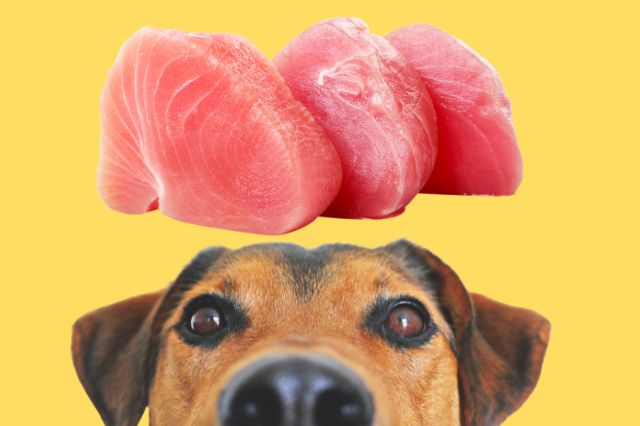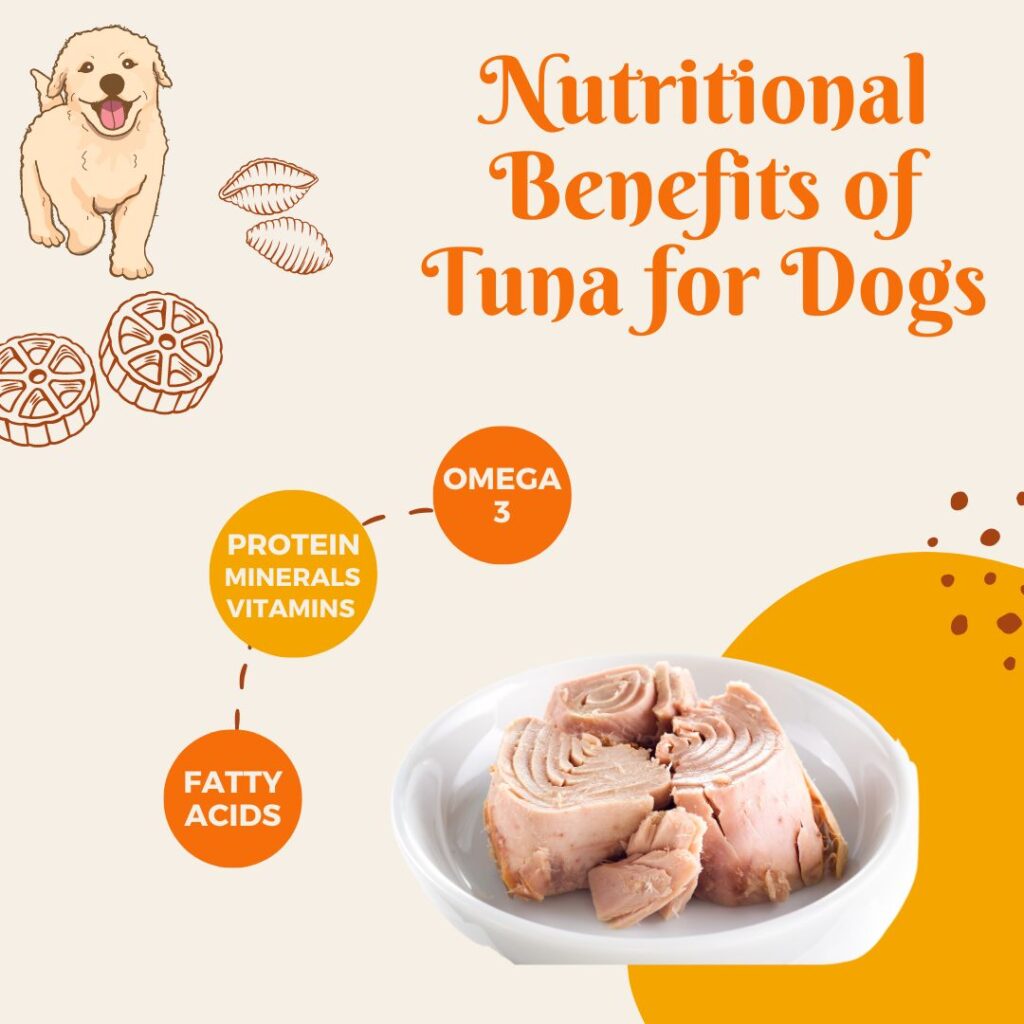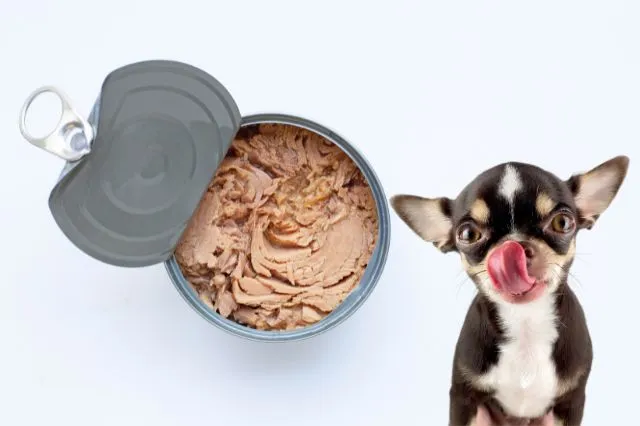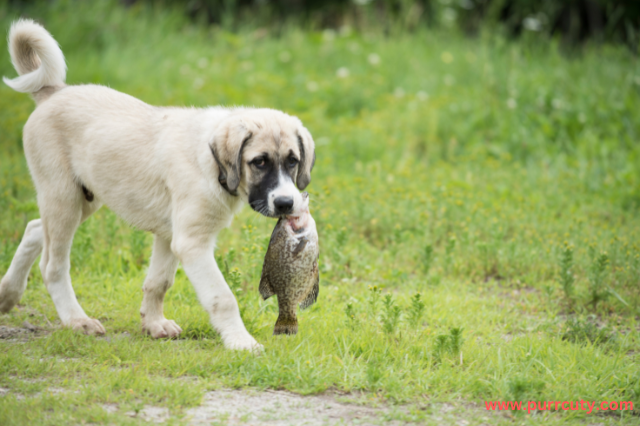Is Tuna Good For Dogs?
Tuna is a popular fish in many human meals, but what about dogs? Can they eat it, too?
The short answer is yes, dogs can eat tuna, but it’s not as simple as tossing them a piece.
While tuna offers some good stuff like protein and healthy fats, there are also some risks, especially when it comes to mercury. So, before you share your next tuna sandwich with your pup, let’s dive into what you need to know.
Table of Contents
Is Tuna Fish Safe for Dogs?

Tuna is safe for dogs in small amounts, but it’s not something they should eat tuna every day. The main reason for this is that tuna, particularly the bigger species, tends to have higher levels of mercury. As an occasional treat, tuna can be fine if you’re careful about how much you give.
Nutritional Benefits of Tuna for Dogs
Tuna is full of good stuff for dogs. It has lots of protein to keep their muscles strong and omega-3 fatty acids to make their coat shiny and skin healthy. Tuna also has vitamins like B12 and D and minerals like potassium and selenium, which help keep dogs healthy overall.

Risks Associated with Tuna for Dogs
However, there’s a flip side. Tuna can carry some risks, mainly due to mercury. Because tuna is a larger fish, it tends to have higher levels of mercury than other fish, which can be harmful to your dog if they eat it too often. Mercury poisoning can build up over time and lead to serious health problems, so it’s something to watch out for.
Related article: Can Dogs Eat Shrimp?
Mercury Poisoning in Dogs
What Is Mercury Poisoning?
Mercury poisoning happens when too much mercury builds up in the body. Tuna and other big fish can contain mercury because of ocean pollution. When a dog eats too much of it, especially over time, they could develop mercury poisoning.
Symptoms of Mercury Poisoning in Dogs
If a dog is suffering from mercury poisoning, you might notice symptoms like loss of coordination, weakness, vomiting, and even neurological issues. In severe cases, it could be life-threatening. If you think your dog has eaten a lot of tuna and starts showing these signs, it’s important to get them checked out by a vet right away.

How Much Tuna Can Lead to Mercury Poisoning?
It’s hard to say exactly how much tuna would lead to mercury poisoning, as it depends on the size of your dog and how much tuna they eat. However, even a little bit of tuna too frequently can be risky. Stick to giving tuna as an occasional treat, and avoid making it a regular part of their diet.
Can Dogs Eat Canned Tuna Fish?

Canned Tuna in Water vs. Oil
Canned tuna comes in different varieties, usually packed in water or oil. If you’re giving your dog tuna, using canned tuna in water is better. Tuna in oil is higher in fat and calories, which isn’t ideal for your dog’s diet.
Is Canned Tuna a Good Treat for Dogs?
Canned tuna can be an okay treat, but it shouldn’t replace their regular food.
Is Canned Tuna Good For Dogs?
The short answer is yes, but only in small amounts of tuna.
How to Safely Serve Tuna to Your Dog
Can dogs eat raw tuna?
When serving tuna to your dog, always make sure it’s cooked. Raw fish can carry parasites and bacteria that could harm your dog, so sticking with cooked tuna is safer.
Proper Serving Sizes for Dogs
When feeding your dog tuna, a small amount is plenty. For a small dog, a spoonful or two of cooked tuna mixed into their food occasionally is more than enough. Larger dogs can have a little more, but don’t go overboard. Always consult your vet if you’re unsure about portion sizes.
Alternatives to Tuna for Dogs
If you’re considering feeding fish to your dog but are concerned about mercury, there are safer choices. Fish like salmon, whitefish, and sardines (in moderation) are great alternatives. They have less mercury and offer the same nutritional benefits.
When Is Tuna Bad for Dogs?
Higher Levels of Mercury
As we’ve discussed, the biggest issue with tuna is its mercury content. Mercury poisoning can have serious consequences for dogs, so tuna should only be an occasional treat.
Salt Concentration and Other Additives
Another thing to consider is the salt content in tuna, especially canned tuna. High levels of salt aren’t good for dogs and can lead to dehydration or even sodium poisoning. Ensure any tuna you give your dog is low in salt and free from harmful additives.
Related article: Can Dogs Eat Avocado?
Can Puppies and Pregnant Dogs Eat Tuna?
Special Considerations for Puppies
Puppies have sensitive systems, so avoiding feeding them tuna is best. Stick to their regular puppy food specially formulated to meet their nutritional needs.
Risks for Pregnant and Nursing Dogs
Pregnant and nursing dogs also need to avoid tuna. The risk of mercury poisoning is higher during this time, and it can affect both the mother and her pups. It’s safer to stick with other dog foods during pregnancy and nursing.
What Should I Do If My Dog Accidentally Eats Tuna?
Immediate Steps to Take
If your dog happens to eat tuna without you realizing it, don’t panic. A small amount probably won’t hurt them. If your pet eats a lot of something or seems to have a bad reaction, watch them closely and get advice from your vet.
When to Contact Your Vet
Talk to your vet if you think your dog has eaten a lot of tuna or seems sick. This will help keep your dog healthy. They can help you decide what to do next.
What Other Fish Can Dogs Eat?

Safe Fish Options for Dogs
Dogs can safely eat other fish like salmon, whitefish, and sardines. These fish have less mercury and are still a great way to get protein and omega-3 fatty acids.
Fish Types Dogs Should Avoid
Avoid giving your dog fish like swordfish or mackerel, as these also tend to have high mercury levels. Make sure to always cook fish before giving it to your dog, and be sure to remove all the bones to keep them safe from choking.
Conclusion: Is Tuna Good or Bad for Dogs?
Remember, when giving your dog tuna, keep portions small, avoid regular servings, and consider safer fish options. If you’re unsure, consult your vet.
FAQs
- Can dogs be allergic to tuna? Yes, dogs can be allergic to tuna, though it’s not common. If your dog has an allergic reaction, they may experience itching, vomiting, or diarrhea.
- Can tuna make dogs sick? Eating large quantities of tuna can be harmful because it can contain mercury, which is not good for your body. It can also cause stomach problems because it has a lot of salt.
- What happens if a dog eats too much tuna? Eating too much tuna can result in mercury poisoning, which affects the nervous system. Contact your vet if you notice symptoms like weakness, lack of coordination, or vomiting.
- Can a dog eat tuna in brine? Choosing tuna in water instead of tuna in brine is better because tuna in brine has a lot of salt.
- Can dogs eat tuna in sunflower oil? Tuna in sunflower oil is higher in fat and calories, so it’s not the best dog choice. Stick to tuna in water for a healthier option.



